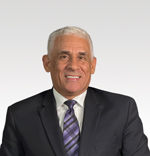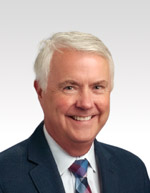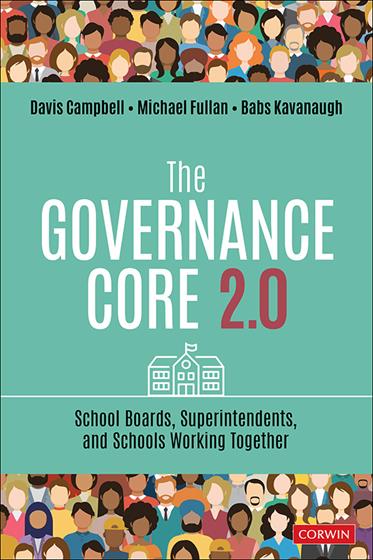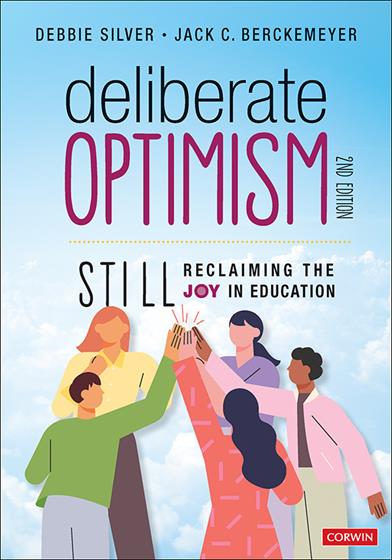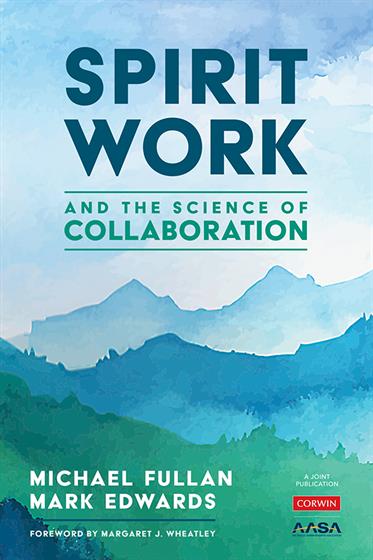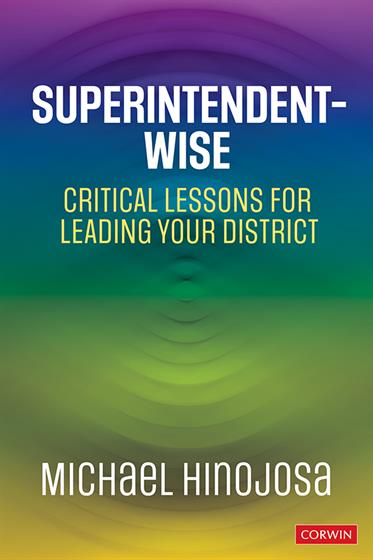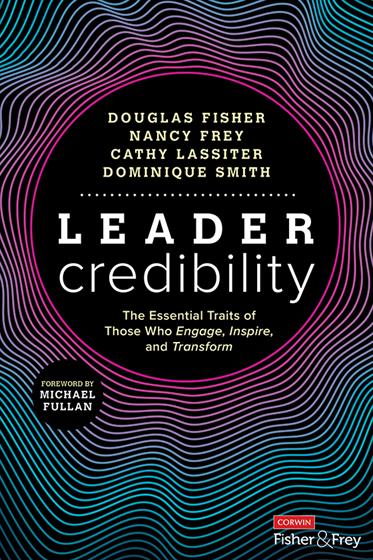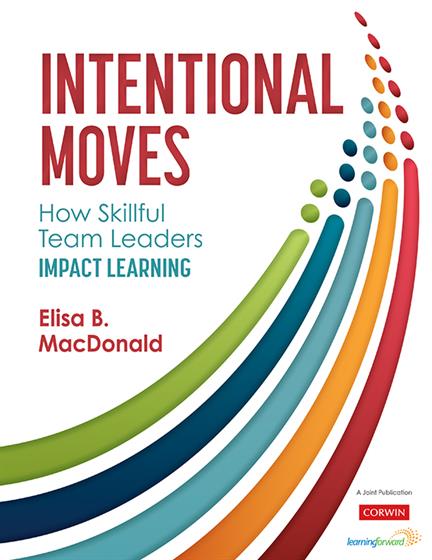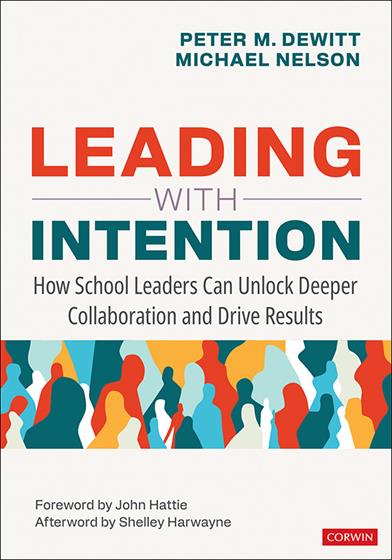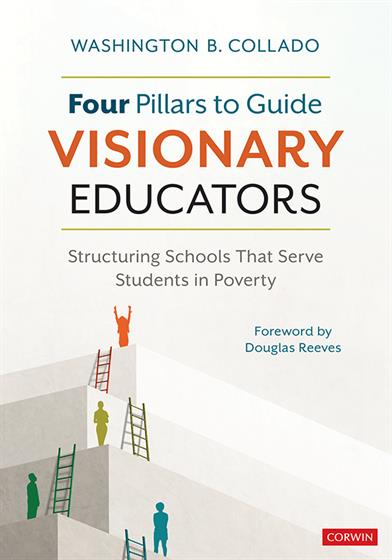[00:00:00.60] PRESENTER 1: Welcome to Corwin's Leaders Coaching Leaders
podcast with hosts Peter Dewitt and Michael Nelson. This podcast is from
education leaders for education leaders. Every week, Peter, Mike, and our
guests get together to share ideas, put research into practice, and ensure that
every student is learning not by chance but by design.
[00:00:26.03] PETER DEWITT: Michael Nelson, here we go with another episode
of Leaders Coaching Leaders.
[00:00:31.26] MICHAEL NELSON: It's a good one, Peter. This is a good one.
Yeah. Our listeners are going to like it.
[00:00:35.58] PETER DEWITT: --every time now.
[00:00:36.29] MICHAEL NELSON: What's that?
[00:00:37.32] PETER DEWITT: I feel like we say that every time.
[00:00:39.86] MICHAEL NELSON: Well, if we didn't say it, people would click
off, right?
[00:00:43.82] PETER DEWITT: That's true. That's true. That's true. Sorry.
No. But I mean, it really is. I was actually looking at it from the standpoint
of we're really pretty awesome at picking guests.
[00:00:57.02] MICHAEL NELSON: And humble, we might add.
[00:00:58.55] PETER DEWITT: And humble about it at the same time. That's the
angle I was going with it when I first started. You're right. We're not going
to start off by saying, wow, what an awful guest. I was just thinking that
we're really good. And when I say "we," I mean our team.
[00:01:16.76] MICHAEL NELSON: Our Corwin team included.
[00:01:18.05] PETER DEWITT: Because the Corwin team behind the scenes too
are Morgan, and Melissa, and Pam. They're all helping us out with this too. And
I'm doing that because I think I learned something that I connected with from
our guest today, who is Nino Collado, is that he in most of the answers that he
provided when we asked him a question, he was always very quick to give a lot
of credit to other people.
[00:01:49.52] And to me, that's such a strength of a great leader that he
was just-- I don't want to say he was enjoyable to talk to. It was because it's
more than that. He has a phenomenal background story that led him to the place
where he is to this day. He's got a book coming out with Corwin in February of
2025, which we will talk about in the podcast. But I just felt his sense of
community that he wants to help create as a school principal was really
inspiring.
[00:02:29.49] MICHAEL NELSON: He does have a story, and he's OK sharing his
story. We all have our stories. And I think he really has the strong belief of
your stories make you authentic, whether you're in front of your students and
sharing or you're in front of staff and use your story to gain greater
authenticity with them. And he used a phrase that I think I'm going to start
using, internal cohesion.
[00:03:04.00] PETER DEWITT: Mm.
[00:03:04.44] MICHAEL NELSON: And he really just talked about making sure
that there's all connections. They're not just one reliance on a single leader,
but that there's internal cohesion, meaning the web of connections. Whether
you're a seasoned math teacher, I think was his description, and you have
things to offer, or a brand new teacher, or you work in the cafeteria, or
you're a bus driver, you are all connected to the greater good and of serving
students, which, boy, students sure seems to be a thread throughout each and
every podcast that we've done this season.
[00:03:46.60] PETER DEWITT: Yeah, and I love that. And for people that don't
know his background, Nino Collado, also known as Dr. C, was a teacher in New
York City. He was an assistant principal and a principal for a long time in
Broward County in Southern Florida. And he has recently retired, but he has a
book coming out with Corwin called Four Pillars to Guide Visionary Educators.
[00:04:10.39] And the subtitle is "Structuring Schools that Serve
Students in Poverty." And he seemingly knows a lot about this. This is
something that he has spent his life working on. So we are looking forward to
all of you hearing the podcast interview with Nino, and you will not be
disappointed. So enjoy.
[00:04:35.15] [AUDIO LOGO]
[00:04:38.91] PRESENTER 2: Picture yourself popularly known among staff
members as the reliable go-to person who makes meaningful change happen. This
is possible when you equip yourself with robust strategies and tools from
Corwin's leadership workshops. Sign up today at corwin.com.
[00:04:54.22] PETER DEWITT: All right. Nino Collado, welcome to the Leaders
Coaching Leaders podcast.
[00:04:59.89] WASHINGTON COLLADO: Thank you so much. It's my pleasure to be
here with you and Michael.
[00:05:04.33] PETER DEWITT: All right. I have a question. I know that it
happened before we started recording. But I'm getting these emails about
interviewing Washington. And as soon as we get on, Michael asks you, so do you
go by Washington or Nino? So tell us why Nino over Washington.
[00:05:24.49] WASHINGTON COLLADO: So my name is Washington, Washington
Collado. And after the first sentence, when we strike a tone of familiarity, I
go by Nino. Nino is a familiar term. It just means that we are in comfortable
grounds. So I go by Nino most of the time.
[00:05:45.48] PETER DEWITT: I like that. And I think that leads me to a
bunch of questions. You have a strong leadership background. And you've got a
book coming out with Corwin in a few months that we definitely want to be able
to talk to. But I like that idea of how we can come to comfortable ground.
[00:06:06.94] WASHINGTON COLLADO: That's right.
[00:06:09.57] PETER DEWITT: We're focusing the season a lot on leading with
intention. How do you lead with more intentionality? And as soon as you said it
before we started recording and when you just said it, just to me that strikes
me as leading with intention. So when you talk about finding comfortable
ground, or leading from comfortable ground, or meeting uncomfortable ground,
how did you do that as a school leader with students, and staff, and families?
[00:06:40.57] WASHINGTON COLLADO: The first thing that understand is that
people like to feel respected. And you find ways of testing that feeling of
feeling respected in different aspects in a principal's life or a teacher's
life-- an educator's life, for instance-- if a child is very upset or, say, as
a principal, if a teacher is very upset-- if the teacher is very upset, there's
a level of trust in expressing that dissatisfaction of the moment or the
situation.
[00:07:14.09] And if there's a level of trust where I could authentically
express to you how I feel and what I'm feeling, that can only come across if
they buy into the relationship of safety. And that relationship of safety is
highlighted when they feel that they've known you, that they know you, and they
also know lines of demarcation, to be sure.
[00:07:42.47] But when I as a principal walk into a classroom or walk into a
meeting, that's one thing that I like, that there's a degree of safety. And
there's, of course, a grounds of professional behavior but safety above all in
expressing ideas, and expressing thoughts, and challenging mind, and for us to
be on the same page in terms of where are we going with this idea, with this
concept, with this notion, with this initiative.
[00:08:12.89] I did not invent the wheel. I'm just old and seen many wheels.
So if you have an idea different than mine, I want you to feel safe telling me,
hey, Dr. C, I know you wanted us to do it this way, but what if we do it this
way, or that way, or the other way?
[00:08:30.60] So that familiarity-- and I know it's a long-winded answer-- I
promise I'll be shorter on my next ones. But that safety in approach allows me
to get the best ideas because there is a safety in expressing it.
[00:08:51.17] PETER DEWITT: I don't think you should shorten your answers. I
think your answer is perfect the way it is. So that was OK with me.
[00:08:58.23] MICHAEL NELSON: Absolutely. Your journey has been quite
amazing. And I guess I was struck, Nino, of the experiences that you had at a
young age and losing your mom. And I lost my mom at a young age. So I feel that
stood out and the journey that you've had in coming to the United States.
[00:09:25.40] Tell us a little bit about that and how has that impacted you
moving from a child to an adult, into your career, and particularly as you
think of working with students and your new book coming out.
[00:09:41.93] WASHINGTON COLLADO: Michael, I was seven when my mom passed
away. And at that moment when I saw her, someone from a really small village in
the Dominican Republic-- and when I saw her being taken away and the peasants
because she worked-- she was a teacher deep in the mountains, and they would
bring her a chicken.
[00:10:07.26] The little bit of they had, they shared with her with such
gratitude of thanks for teaching my kid how to read and write. And she would
teach the adults how to read and write at night. So that level of gratitude
that she experienced and my six other uncles and aunts experienced, I knew that
that's what I wanted to do with my life. So at seven, I knew that I wanted to
be a teacher.
[00:10:33.11] Coming to the United States at 13, I also was very clear that
I had a line of people, from Mr. Roberts, Mrs. Phillips, Mrs. Aaron, Mrs.
Israel, who believed in me enough for me to not accept the fact that this
language thing was on my way. And they helped me out. I remember Mrs. Phillips.
When I applied to Queens College, we got denied. And she goes, I'm going to
give you a moment of my life, because my English wasn't up to par.
[00:11:10.96] So we rewrote the application and got into the City University
of New York, Queens College, through a special program they call SEEK, which
basically allowed me to take classes while I strengthened my English. And five
years later, I graduated out of the dean's list as a teacher. So there were--
and this is why I write and you as well.
[00:11:37.32] We have to be intentional. We have to be-- everything that we
do has a repercussion. And that repercussion could be making or breaking the
dream of a person who wants to serve the greater good of society. And I found
that, as I say, in Mr. Roberts, Ms. Phillips, Ms. Israel, Ms. Aaron, and so
many others, Vicki Kaufman, who was one of my great mentors coming up the ranks
as an educator and as a principal.
[00:12:04.12] So what we do is important. And I learned that very early on
by the example that my mother set.
[00:12:16.16] MICHAEL NELSON: I have one more mom question, Peter, and then
I know you'll go on. But if your mom were alive right now, what would she say
about what you've done with your career?
[00:12:29.34] WASHINGTON COLLADO: I think she would be pleased that I became
a teacher, that my sister has a school teaching language to adults in Miami,
that my other sister reveres education, and her daughters are doing well. I
think my mom will humbly not even think much of it and just simply be very
proud that we are serving the greater good by the way she did without feeling
that she is due any credit. And she is due all the credit.
[00:13:11.04] MICHAEL NELSON: Thank you.
[00:13:11.49] PETER DEWITT: I see your answer as a representation of your
mom because as soon as Michael asked you that question, you were quick to point
out your sisters as well and not just you.
[00:13:23.84] WASHINGTON COLLADO: Yes, sir.
[00:13:25.31] PETER DEWITT: That was within your answer. You've been a
strong advocate for integrating Latino history and culture into the curriculum.
How can educators ensure that the stories and contributions of underrepresented
groups are genuinely included in American education?
[00:13:44.92] WASHINGTON COLLADO: Because nothing short of that is a
disservice to who we are as a country in the United States. The contributions
of so many people have come together over the years for us to challenge things
that were not right. And we always had that door to challenge, and we have
always been a better country the day after.
[00:14:15.90] And I think to the extent that we find our rightful place in
the contribution, and the building, and the strengthening of us as a country,
it reaffirms the obligation we have to do better, to be better. And if as
educators we do that with a sense of pursuing equity, with an equity mindset,
feeling that, yes, I am included, I have been included in the building, my
culture has been included in the building of who we are now, we are more
compelled to do the right thing for the next group that is coming up the ranks,
whether it's the history of women before the suffrage but after the suffrage,
the history of the civil rights movement.
[00:15:02.17] I remember when I came to the United States in 1975. Latin
America was going through a really bad place. There was wars in Central
America, Chile, Argentina. Dominican Republic had gone through a really bloody
civil war. And I remember, just like now, I saw the civil rights movement as a
good example for us to push the envelope towards democracy.
[00:15:29.62] And I always think that if we place the people that make up
this great nation always in the side of contribution to what we now have, we
could then place greater responsibility in continuing that trend and being more
tolerant, not just tolerant but accepting of our differences because we all
have a stake in the building.
[00:15:56.46] PETER DEWITT: I love that answer. And I'm sorry, Michael. I'm
going to follow your lead and ask a follow-up question because I really need
to. Part of this, we recorded a few episodes for this season. And one of the--
it's funny how common themes can bubble up in conversations. And representation
is definitely a theme that comes up in most of our conversations.
[00:16:21.68] One of the things that I wonder is how did you as a teacher
show, maybe tell your story of growing up to help kids see you as something
they could do as well? Like both of you, I lost a parent when I was young. I
lost my dad when I was 11, and I'm the youngest of five and the first to go to
college.
[00:16:44.61] And I think people have an image because you have Dr.
So-and-so, that somehow you grew up differently. And the reality is we all had
kind of humble beginnings that looked in a variety of ways. But connecting our
story and making sure students are seeing that so they actually see that
representation-- how did you do that as a teacher?
[00:17:10.56] WASHINGTON COLLADO: I had an experience while teaching at
Norman Thomas High School in New York City, where there was a huge fight
between some of the kids from different ethnic groups. And we took the
discussion back to the classroom. I used to teach Spanish at that time. And the
idea was to then-- and the idea was to celebrate a multicultural show where we
included every ethnic group. That was to celebrate who we were and celebrate
the difference we brought to the table.
[00:17:49.21] And that marked me for life because we had kids from Chinatown
presenting the lion dance and the river dance, as well as young lady from
Africa, from Angola specifically, presenting dances from Angola. At that time,
rap was coming into the scene. The Spanish kids, Puerto Ricans, and Dominicans
presented salsa, merengue, and some of the teachers got involved in the
presentation.
[00:18:15.47] So that day, literally weeks after there was a huge fight, the
auditorium was full of kids screaming and celebrating each other. And I made no
attempt to hide the fact that I also learned English. And my kids, my English
language learning from that time, now are pursuing-- and we stay in touch to
this day, and they showed up at my retirement recently. Some of them are
leading organization, colleges across the nation, and they know that we all
have a road that we have traveled.
[00:19:03.74] I have traveled the road. They have traveled a road. And as
long as you affirm the fact that they are valuable and that they have to work
hard, there are no free meals, you're going to get someone who then believes in
you and what you see in them. And you could then push them towards that
realization. But if they don't believe that you believe in them, pushing them
will come across condescendingly.
[00:19:30.35] PETER DEWITT: Mm.
[00:19:32.74] WASHINGTON COLLADO: But they have to believe, and they believe
more if they know your story. They know I'm a country boy. They know I was
raised in the country. Money was not part of my upbringing. I didn't have not
even running water growing up, but I was never poor. I didn't need money.
Everything I had, we had from the mill to the vegetables we grew.
[00:19:58.05] "Poverty" was never part of my vocabulary. My
grandmother made sure of that. And if they could relate that struggle of you
growing up and making things happen and they believe that you believe in them,
you could push them. But if you push them without the credibility of being able
to push them, then you're not going to get a positive response. That's why it's
important for me to share my story.
[00:20:23.08] PETER DEWITT: Mhm.
[00:20:25.57] MICHAEL NELSON: You have a knack for sharing your story. You
not only have the story, the experience, but the way in which you share it and
the language you use. And frankly, the cadence and how you speak it is just
riveting. And I know our viewers right now are already so glad that they tuned
in to this podcast.
[00:20:48.49] WASHINGTON COLLADO: Thank you, Michael.
[00:20:48.87] MICHAEL NELSON: You have a book coming out next year in 2025
called The Four Pillars to Guide Visionary Educators: Structuring Schools that
Serve Students in Poverty. Tell our viewers a little bit about what they can
experience when they purchase that book in 2025.
[00:21:05.90] WASHINGTON COLLADO: So, Michael, I was fortunate to be
assigned to a school of real high poverty that had gone through a boundary
change. And the free and reduced lunch population went from the mid-'60s to the
mid-'90s, if you will. And we then realized that we had a challenge in our
hands, but we also had an opportunity.
[00:21:34.85] With the right leadership-- and leadership meaning the
department chairs, the teachers-- we decided that there wasn't going to be a
magic approach to being successful. So we realized that by aligning many
initiatives, we were going to then succeed. We then implemented added support
for the students who were struggling.
[00:22:07.04] We implemented a community mapping to see the organizations in
the community that could line up with us, from faith-based organizations, to
the city government, to the district, to the adjacent schools. We made sure
that those folks leading the departments understood curricular cohesion and
implemented professional learning communities.
[00:22:31.52] We made sure that the person-- and this is all to his credit,
Dr. Drake, the person doing the master schedule-- had teacher strength with
students' needs and necessities. And we made sure that not one single person
was in charge of everything, but everybody was in charge of everything.
[00:22:55.70] And to the extent we had internal cohesion, we were able to
build on each other's strengths. If I had, say, Jordan Davis, one of my new
teachers, teamed up with the excellent teachers around the math department, he
automatically on day one tapped into 40 years' worth of experience through a
good cohesion of the curriculum program in math and vice versa. A teacher who'd
been teaching for a long time tapped into his freshness of bringing computers
and technology and how to do things.
[00:23:27.93] So the idea was that there wasn't a silver magic way of doing
this, but there was a concrete alignment of what we saw as an organization for
our students and the mission that we saw for our students in terms of what they
did daily with action plans, curricular, social, emotional, and us to take care
of each other and bring in the organization that we are proud to feel part of.
All of those things came together perfectly.
[00:23:59.86] And then, as God would have it, I won principal of the year
for Broward County. But I can promise you-- and this is not false humility--
this is nothing I did. I remember when I was nominated my friend, Jack Beasley,
who was a principal-- I wasn't going to follow up with the nomination. He goes,
you don't understand the nomination. The nomination is that you are the best
principal. The nomination is that you lead an organization of good educators.
[00:24:29.89] So when you're being principal of the year, you celebrate the
custodian, you celebrate the secretary, you celebrate the teachers, you
celebrate the parents, you celebrate the student, and you celebrate the
community. You're just accepting the award. So if you do not apply, you're
saying that their work and what you guys have done together, you're not seeing
it.
[00:24:50.48] So I did apply, and I was fortunate to get it. But in my
speech accepting it, I was very knowledgeable that it was a together thing, and
that's what we were able to do.
[00:25:03.02] PETER DEWITT: So you're amazing to talk to. When I think about
leaders right now, one of the things Michael and I often hear from people-- I
mean, this is worldwide-- a lot of the issues that we used to face before COVID
were kind of isolated in different schools. And now it's just this universal
teacher attrition, leadership attrition, workload. All of these things are
universal.
[00:25:36.26] If I'm a brand new principal who is listening to you, I'm at
risk of feeling like, man, this guy is just like up here. I could never do
that. What are the-- I know this is kind of an unfair question, but it's an
important one-- if I'm a brand new principal and I have the goal of having the
kind of impact you have in the future, where are some places that I might want
to start?
[00:26:10.81] WASHINGTON COLLADO: That's a good question for me to be
grounded in what I control and what I don't control. So if you're a new
principal out there comparing yourself and thinking that I got to have this
level of professional success by doing great things, I don't mean to disappoint
you, but I'm going to disappoint.
[00:26:38.26] No. My professional success has been by doing the little
things, by empowering, by knowing who you hire, by visiting the classrooms, by
asking the good old New York question, how are you doing, and waiting for the
answer, making sure that you have a nexus to the community, that you know who
makes the community with you, like I said, from the faith-based organization,
the veterans organization, the city officials.
[00:27:14.14] Build relationships, and together you build the school that
you want to be. There are no Superman. And if Wonder Woman or Superman exists,
they're not coming to your school. So trust yourself to do the right thing as
long as you have a vision for the school and you have that vision tied to a
moral compass of what you will do and not do.
[00:27:40.08] And that vision is tied to mission, which is basically the
daily things that you will do to accomplish getting that directional
aspirational vision. And you have plans of action. You're going to do great
things, but do not marvel on the superhuman nature of other people that you
don't know, including me, and concentrate on the things that you have in your
plate, and trust yourself to do the right thing.
[00:28:10.88] And if we were to do that, we put humanity and those who have
accomplished, as well as those who have failed, but also a humanity amongst us
and control the things we can't control. And things are more obtainable.
Because it looks easy, and it's easy to then be elevated to a place that you
don't deserve to be elevated.
[00:28:41.94] I lucked out to work with amazing people and people listening
to the podcast. If you are in my community, you know who you are. And I
benefited from that.
[00:28:56.36] MICHAEL NELSON: Sure made me think of, as you were speaking
just then, Mother Teresa. Famous Mother Teresa quote, "Do small things
with great love."
[00:29:08.69] WASHINGTON COLLADO: That's exactly what it's all about. Do
small things with great love, and this whole giant journey begins with one
step. And what you say and how you say it matters. One of the things always is
how did we go and find Dr. King, a priest, a preacher in a community in
Atlanta, to lead the civil rights movement? And it was because he had the right
believability. And what he said mattered to the extent that it compelled other
people to follow him.
[00:29:49.70] So when he disappeared physically, quite the opposite effect
of his ideas going away, they became reaffirmed. So do the little things that
you do control without looking for superhuman nature power of other people that
have succeeded because that doesn't exist.
[00:30:09.23] MICHAEL NELSON: Yeah. And they're all little things. I love
that quote as well. So I know if you're just listening to the podcast, you're
not seeing the incredible background that you have on your screen. And it's
filled with-- I have to believe that it's filled with great memories, whether
it's books that you've read, or photos of individuals that you love, or
significant achievements that you've had during your career.
[00:30:45.38] If you were to pick one item in that background and share with
our guests the meaning behind it and why it's an important part of your office,
what would that item be?
[00:30:56.59] WASHINGTON COLLADO: I'm going to pick two, Michael. I'm going
to pick my mother's flag from 1949. This flag waved in her school in the little
village where she was a principal. And I'm going to pick my flag in 2005. The
minute I became a principal, I had the flag brought down, and I kept it with me
ever since when I became a principal in the United States in 2005. And I
remember the awesome privilege of leading learning in an organization.
[00:31:31.34] So those two. Number one, the one that put me in this path to
education, and then the American flag that gave me the opportunity to enact
everything that I had in my heart as a principal. I drove by the school a
million times, and I could not believe that spot that's the principal parking
belonged to me. And I had that awesome responsibility. So those two that are
behind me, I revere those two flags.
[00:32:03.63] MICHAEL NELSON: Thank you for sharing that personal story with
us.
[00:32:06.58] PETER DEWITT: OK. So I have to ask about the book because I am
hoping because Michael loves a good story, and he is a storyteller. And you
clearly are as well. And I mean that in the most positive way possible. But I
have to imagine that in your book what we are getting from talking to you in
person is what people are going to receive when they're reading your book.
[00:32:34.52] When they're reading your book, what are a couple of things
that you are hoping are going to be major takeaways for them? If they read this
and this is the idea that they're walking away with, you're going to be really
happy about that. What are a couple of practical ideas that you're hoping
people are going to walk away with that will help them become more successful
in leadership?
[00:33:00.49] WASHINGTON COLLADO: Everything that I feel, Peter, sincerely,
without exaggeration, that has taken me my 40 years of professional life to
write this book. Specifically, control and exert control over the things that
you can control. Don't overwind on things that you cannot control because what
that does-- sometimes it gives you an excuse to not control over the things
that you can control. That's number one.
[00:33:35.84] For instance, we get into the book on everybody wants to be
proactive, proactive, proactive. But sometimes you have to be reactive. You
have to look at the students coming in. If you're in middle school, look at the
kids in the sixth grade, and look at the data, and the attendance, and the
failure rate. And the kids that come to you already beat up in so many ways
academically.
[00:34:00.91] You have to react to that. When you react to that and you put
together as a team what are we going to do about it, you become active. When
you become active and take care of your kids' attendance, socioemotionally you
link up with your community. Then you become proactive because you change
dynamics, and paths, and things that will automatic if you put the right
equity-minded initiatives in place.
[00:34:29.62] And of course, the most important thing is for you then have
an organization where you have been reactive to data that you came across. You
actively are putting a plan together. You proactively are changing a failure
path to a path of success. Now, with you being interactive, you strengthen your
team to continue that. So you're going to-- there's a section in the book that
talks about those four elements of being reactive, proactive, active, and
interactive as a way of addressing kids and using data to specifically paint
the face of a child.
[00:35:15.54] If you talk in monolithic terms, 80% and 70%, you fail to see
Joe, Mary, Jose. And you fail to paint a human story that data hides sometimes
when we just use it to kick around percentages. And those are the things that
you're going to see over and over again reiterated in different ways.
[00:35:40.03] PETER DEWITT: Fantastic answer.
[00:35:42.38] WASHINGTON COLLADO: Thank you.
[00:35:45.67] MICHAEL NELSON: Peter?
[00:35:47.01] PETER DEWITT: [CHUCKLES] Well, I want to say it's been really
an honor to talk to you, Nino. I know I speak for Michael when I say this. I
look forward to reading this book. It's just been an honor to talk to you over
this time for the podcast. So thank you for being on the Leaders Coaching
Leaders podcast.
[00:36:09.90] WASHINGTON COLLADO: It has been my absolute pleasure. And if
you ever want to continue this conversation after you read the book, I'd be
more than happy to join you and continue this conversation. And one thing that
I wish-- and you get it in the book-- is for you as a school leader, whether
you're in the classroom, in the principal's office, or as an office manager in
the office, look to find organizational rhythm.
[00:36:46.20] If you look at great bands-- Earth, Wind, and Fire, El Gran
Combo from Puerto Rico, who was just been recognized with the Kennedy Center,
Bob Marley-- they have organizational rhythm. That's what you want. You want to
listen to the difference of instruments that you have at your disposal and make
sure you let them play individually when they have to play individually and
together in unison when they have to play individually.
[00:37:14.23] Look at all your students. Look at the students that are
performing well. Look at the students who are not performing well and what kind
of conditions are we putting around them for them to be their best self. And as
an educator, control what you can control. Don't wait for Superman.
[00:37:33.94] PETER DEWITT: I'm glad you just ended with that because I love
that idea of organizational rhythm. And it's good imagery to think of as we
close out. So once again, Nino, great to talk to you. Thank you.
[00:37:48.67] WASHINGTON COLLADO: Great talking to you, Peter. And great
talking to you, Michael. Thank you so very much.
[00:37:52.69] MICHAEL NELSON: Thank you.
[00:37:53.87] [AUDIO LOGO]
[00:37:57.60] Wow. We just had a great podcast interview with Nino Collado.
And wow. Just incredible insights that we gained from him, Peter, and just
loved-- there were just tips that were not surface-level but deep, if
implemented.
[00:38:18.11] PETER DEWITT: Mhm. What did you like the most about the
interview? I feel like I'm interviewing you. Because you're such a storyteller,
and I mean that in a positive way. I think we've grown up with the word
"you're a storyteller," and we look at that as a negative thing. But
you're such a great storyteller, and you connect so well with stories.
[00:38:37.87] But I'm just wondering out of the whole interview that we were
doing what is the part that you connected with the most. Like, what did you
like the most about it?
[00:38:48.03] MICHAEL NELSON: I'm going to say two things because he used
that phrase. He humanized himself as a leader in our interview with us. He
shared the story of the two flags that were hanging. If you're viewing this
podcast, you'll see the two flags in the background. Sharing the story behind
that, why he has those hanging, gives the level of a-- humanizes the leader to
a point where it builds a different level of credibility.
[00:39:22.08] I want to learn more. I want to be in a learning or work
environment with the type of person and how he's describing himself, which I
think is just-- I'd be curious from our viewers if they would want to work in
an environment led by Nino after hearing this because I feel like I would.
[00:39:48.76] And then the part that has me a little bit pondering, number
two of what stood out, is he talked about the importance of doing the little
things. But if you listen to it, he shared the importance of visiting
classrooms and the importance of building relationships. Part of me wanted to
follow up and say, how are those little things to you? Because you and I work
with a lot of schools and school districts. And I think we present those as big
things, the important pillars of how you build what he talks about in that
cohesion.
[00:40:34.20] So those are the things that are resonating with me.
[00:40:38.57] PETER DEWITT: I loved that question, by the way, when you
asked him, because as soon as-- what people don't know is before we started
recording, he said, I'm going to turn off my screen or my background. And all
of a sudden, you just see this huge library and all these medals. And it's so
funny because it's not like I texted you and said, hey, ask him a question. You
asked him that question.
[00:41:03.45] And I thought, I have been staring at his background this
whole entire time, looking at the medals, looking at the flags, looking at the
books. And I never would have asked him that question. And I love that you did,
because that was a question that I kept thinking of. But you were the one who
asked it, and I never would have.
[00:41:19.20] And I think that's a benefit of somebody turning off their
background as well, because you can see behind. You were so spot on when you
said, you know, I imagine that those are books you've read, and those are
pictures of loved ones, and those are special events that you have mementos
from, and all of that kind of stuff. And I love that you asked that question.
So thank you for doing that.
[00:41:41.09] To me, I also enjoyed his-- you had mentioned it during the
interview, and you were right then when you said it. You said something about
his cadence and the way that he was speaking. I found that I was just leaning
in when he was talking. And good speakers, good orators, is really important.
His last point-- and it wasn't based on a question that I had asked-- it was
just wrapping up the interview. And he talked about the organizational rhythm,
and he compared it to Bob Marley and bands.
[00:42:22.02] And it's just kind of funny because what people also don't
know is that we've done a couple of recordings today. And both of them have
focused on music, and it's not like we set it up that way either. But I really
enjoyed that whole idea of organizational rhythm because that word
"rhythm" just to me is an intriguing word. I love when something's in
rhythm. So that's fantastic. Yeah.
[00:42:45.88] MICHAEL NELSON: Well, and he talked about that rhythm as there
are times when there needs to be a soloist. And then there's a time when we
need to be working together in harmony. And then there's a time-- I mean, it's
like it was like, oh, goodness. There's so much you could play off of that. And
it was a really good visual for both of us.
[00:43:05.53] PETER DEWITT: Or I could imagine your son Hans would feel the
same way when he's definitely listening to this podcast because he has that
musical background. And he's a school leader, and I think that could probably
resonate with him quite a bit.
[00:43:19.27] MICHAEL NELSON: Yeah. I did think about Hans a lot then.
[00:43:21.97] PETER DEWITT: Yeah. Well, Michael, I know we've said it every
time, but it's really honestly true. I just feel very fortunate to be able to
engage in these interviews. Sometimes there are people we know very well. And
we're trying to-- we can't wait to talk to them. And other times, it's somebody
that Pam, or Melissa, or Morgan might say, hey, check out their bio, and do you
think they'd be a good interview?
[00:43:49.31] And we don't necessarily know them, and then we lean in right
away. And just it really goes to show that everyone that we meet, everyone
sitting in our audience when we're facilitating workshops, everyone that we're
engaged in coaching with, all the kids that were teaching, they all have a
story. And they have stories that are really worthy of being told.
[00:44:16.76] And I just feel grateful that we get the opportunity to do
that. I know that sounds very, very deep. And maybe I'm just in a really deep
mood. But I just think from talking to Nino in general, it just kind of shows
that everybody we meet has a story. And if we shut down those opportunities to
have conversations, we're really missing out on a lot because they can be
very-- they're just very empowering and inspiring to hear.
[00:44:44.65] MICHAEL NELSON: I agree. Always a pleasure to work with you,
Peter.
[00:44:49.53] PETER DEWITT: Yeah, always good to see you too, Michael. Until
next time, thank you, everyone, for listening. As always, please provide us
with feedback. We're really grateful for the fact that you would listen to the
podcast. And we always want to hear how it's resonating with you. And if you
have guest ideas, we often hear from people that want to give us guest ideas
too. That's awesome.
[00:45:12.09] So thank you, and until next time.
[00:45:14.84] [MUSIC PLAYING]

